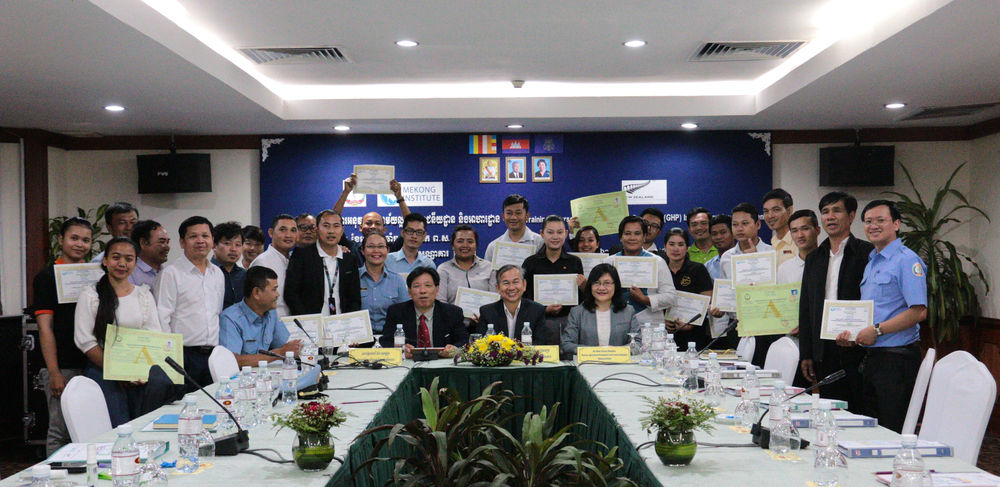As part of Cambodia Food Safety Week, a localized training on Good Hygiene Practices (GHP) for Restaurants and Canteens was held on November 7, 2018 in Phnom Penh Hotel, Cambodia. The training focused on proper food handling, preparation and storage as food safety fundamentals in the catering industry.
Organized by Mekong Institute, in collaboration with the Food Safety Bureau, Department of Drug and Food (DDF) of the Cambodia Ministry of Health (MoH), the training was attended by 20 food handlers from the catering industry who were equipped with the basics of food safety, principles of good hygiene practices and guidelines for applying GHP certification and hygiene label from DDF.
In her opening remarks, Ms. Maria Theresa Medialdia, Director of MI’s Agricultural Development and Commercialization (ADC) Department, briefed the participants on the background of MI and PROSAFE Project. She explained that food is prone to contamination at all stages from farm to table. “Farmers use agricultural chemicals, fertilizers and pesticides; while processors and retailers may prepare or store food improperly, or may fail to adhere to hygiene standards.” She further explained that the efforts of farmers to produce safe food will be useless if food products are not handled properly along the rest of the food supply chain, particularly in the consumption stage.
“The mishandling of food and unhygienic preparation in restaurants and street food stalls continue to cause frequent foodborne illnesses in the country, hence training of food handlers is necessary in preventing associated risks,” she added.
Likewise, Dr. Heng Bunkiet, Director of the Department of Drug and Food, briefed participants with the significance of food safety and how it affects public health. He added that foodborne illnesses are among the most common public health problems in both developed and developing countries.
“To ensure safe food for all consumers, we continuously provide training to food handlers in food and catering businesses to strengthen their knowledge on food safety practices. We aim to address hygiene-related issues including cross-contamination, lack of personal hygiene among workers, and mishandling of food during cooking, cooling, and re-heating phases,” he said. He concluded his speech by encouraging the participants to improve their current standards and practices and apply for GHP certification for their food businesses.
MI, through the support of the New Zealand Aid Programme, also provided further support to its training participants in applying for GHP certification and hygiene labeling. At the end of the course, MI and MoH awarded the hygiene certificates and GHP grade A logos to 15 restaurants and food canteens who attended the GHP training last year.








